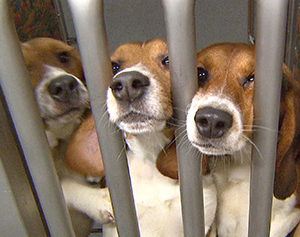New 2016 statistics reveal increased suffering in Irish animal labs
New figures covering 2016 released by the Health Products Regulatory Authority (HPRA) have revealed a disturbing trend of increasing animal cruelty in Irish laboratories. They reveal a rise in “severe” experiments to 66,303 from 62,246 in 2015, and “moderate” severity experiments up from 49,705 to 58,832. European and Irish law classifies “moderate” severity to include inducing cancer in animals, restraint in a metabolic cage for up to 5 days and acute poisoning tests that stop just short of death. In other words, “moderate” severity tests can be highly painful and distressing.
The overall number of experiments are down very slightly by about 1% in 2016 to 226,934 experiments, from 228,975 in 2015. Only procedures likely to cause pain are counted.
The IAVS is truly appalled that no meaningful progress is being made to reduce the number of harmful animal experiments in Ireland and, even worse, the overall severity of the experiments is actually increasing.
The increase in suffering is being driven by an expansion in poisoning tests, rising from 157,872 to 170,976 in 2016. Over the past decade, Ireland has become the base for a horrific industry involving the injection of botox-type products into mice to assess their potency. All the animals either die from the injected toxin or are killed at the end of the testing period. Despite the majority of these tests being for products used for cosmetic purposes, the government statistics misleadingly portray these tests as being for medicinal products such as vaccines, which in fact only make up a small proportion. Almost 170,000 animals were sacrificed in this way in 2016.
In addition to 192,121 experiments on mice, other subjected animals included rats, guinea pigs, cows, rabbits, ferrets, goats, pigs and birds. There were also increases in the number of tests on cats, dogs, equines and fish. The number of ‘basic’ research tests – designed to produce knowledge rather than foreseeable practice benefits – fell from 42,347 in 2015 to 28,340. However, the number of so-called ‘translational’ tests purported to indicate likely effects in humans rose from 22,984 to 26,230. This is a regressive trend given the growing awareness in the scientific community of the unreliability of tests in animals as a guide to human reactions.
The 2016 statistics now include additional tables detailing toxicity tests, following complaints by the IAVS that the HPRA was failing to meet EU legal requirements. However, at the same time, the HPRA has stopped reporting how many animals of each species are used in specific types of tests. This appears to, at the very least, break the spirit of EU law which is supposed to promote increased transparency and provide information detailed enough to support efforts to reduce and replace animal tests.
We are witnessing a tragic lack of political will and leadership from successive governments in Ireland. This is another area of policy where the Government seems completely subservient to corporate interests at the expense of public morals and animal welfare. The IAVS calls upon the Government to end its indifference to severe cruelty and devise a strategy to honour its legal and moral duties to reduce the terrible toll of animal suffering that it permits in Irish laboratories.


